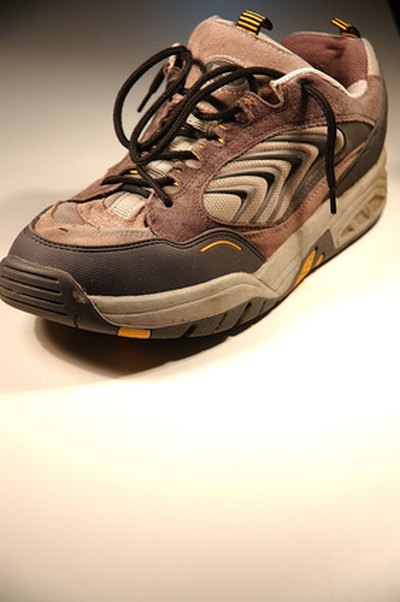Author
by
http://www.livestrong.com/article/230554-the-best-running-shoes-for-bad-big-toes/
by
If you're a runner with big-toe problems, consider several things before purchasing new running shoes. First, your toe problems may arise from having a shoe that is not designed for the mechanics of your foot. Second, you may also need a running shoe orthotic insert in order to correct your foot biomechanics. Finally, you may need a wider shoe designed with a wider toe box, which will give your toes more room. Whatever the case, it's important to have a professional measure your feet, observe your running mechanics, and fit you with a shoe.
Common Pitfalls
The easiest way to buy a shoe that's going to cause problems for your big toe is to buy one online without having a professional evaluate your feet. When buying online it's easy to purchase shoes that are not designed for your foot mechanics, not wide enough, or simply not designed for where you run. There are many important factors to consider before buying a running shoe, especially if you already have big toe problems.
Where To Buy
Runner's World offers a comprehensive Shoe Finder, which will find the best shoe for you and recommend stores. The shoe finder will ask your gender, review the types of shoes for your foot mechanics and the type of terrain that you run on. Then, based on the manufacturers and price range you choose, it will recommend a shoe and where to purchase it. Runner's World also offers shoe reviews, explains foot mechanics, provides a wet test to determine arch, and explains both the female foot and orthotics.
Cost
A good pair of running shoes, available in different widths to accomodate big toe problems, can cost upwards of $100, depending on your mileage. Count on spending at least $75 for a decent pair. If you have foot problems, you should factor in a possible insole which can run between $18 and $50 or more for one made specifically for your foot.The average lifespan of a running shoe varies from 300 to 500 miles, so if you're an average runner doing 20 miles a week, you can plan on buying two pairs of shoes a year. Your weight, where you run, and how you run will all affect how quickly your shoes break down. If they start to feel like they're not giving you good protection keep an eye on them and be ready to replace them.
Comparison Shopping
When you have foot problems, it's always best to visit reputable running stores in person to discuss different types of shoes and insoles that will help with your condition. If you'd like to do some research beforehand online, Road Runner Sports has a Shoe Dog, which works like the Runner's World Shoe Finder. The Shoe Dog will ask you about your gender, the type of terrain that you run on, your arch type, foot mechanics, any injuries, and the size of your body frame. Based on this information, it will provide you a variety of shoes available from different manufacturers at different prices. Because it asks about the injury information, this is a great resource to have some point of reference before visiting a shoe store.
Accessories
Depending on your big toe injuries, you may also need a corrective orthotic insole to improve your running biomechanics. A good shoe store will have experienced salespeople trained to observe the way that you run and assist you in determing and improving your foot mechanics. In some cases, however, you may need to see a doctor for your orthotics, depending on the injuries to your feet.
Insider Tips
A reputable running store will let you try on several pair of shoes and let you take them for a test drive. They will have salesclerks who are experienced runners and are trained to observe you run, discuss your running training with you, and recommend the best shoe. Stores like "Fleet Feet" and "Jock-n-Jill" will let you return shoes that don't work out as expected.
http://www.livestrong.com/article/230554-the-best-running-shoes-for-bad-big-toes/








No comments:
Post a Comment